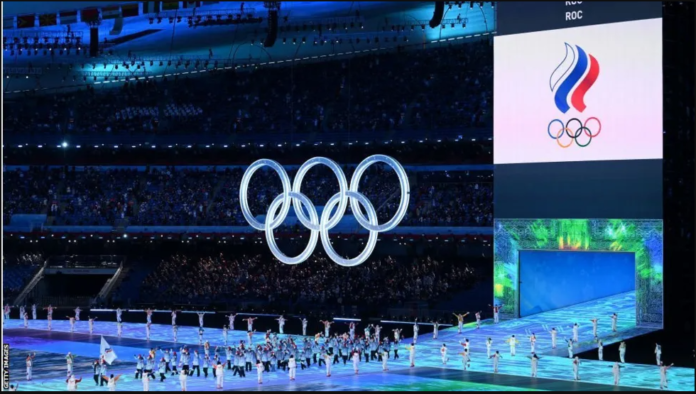Russian and Belarusian athletes who have qualified for the Paris 2024 Olympics will be allowed to participate as neutrals, the International Olympic Committee has confirmed.
The conditions of their inclusion include competing without flags, emblems or anthems of their country.
Athletes from those nations were banned following Russia’s invasion of Ukraine in February 2022.
Letting individuals take part was about “respecting human rights” the IOC said.
However, World Athletics said its position remains unchanged, with athletes, support personnel and officials from Russia and Belarus remaining excluded “from all World Athletics Series events”.
“You may well see some neutral athletes from Russia and Belarus in Paris, it just won’t be in athletics,” World Athletics president Sebastian Coe said on Friday.
Speaking at the World Athletics Council Meeting in Monaco, Coe added: “We have a fixed position. I think it is right that International Federations should make judgements that they feel is in the best interest of their sport. That is what our council has done.”
Ukraine had threatened to boycott the 2024 Games if the ban was not upheld but Ukraine’s sports minister Vadym Huttsait told Reuters in July it could drop that threat if Russian and Belarusian athletes were made to compete under a neutral flag.
The IOC’s decision comes after Olympic sports federations asked for Russian and Belarusian athletes to be allowed to compete as neutrals in Paris earlier this week.
“The executive board of the IOC has decided that individual neutral athletes (AINs) who have qualified through the existing qualification systems of the International Federations on the field of play will be declared eligible to compete at the Olympic Games Paris 2024 in accordance with the conditions outlined,” the Olympic body said on Friday.
“AINs are athletes with a Russian or Belarusian passport. The strict eligibility conditions based on the recommendations issued by the IOC executive board on 28 March 2023 for international federations and international sports event organisers will be applied.”
Paris 2024 organisers said they were “taking note” of the IOC’s decision and reiterated that qualification for the Games “falls under the responsibility of the IOC and the International Federations”.
“Paris 2024’s responsibility is to host athletes who have qualified for the Games under the best possible conditions, regardless of their nationality,” organisers said.
‘Strict eligibility conditions’
The IOC outlined six “strict eligibility conditions” for AINs at Paris 2024 reflecting the same conditions under which they have qualified.
It said among the 4,600 athletes who have so far qualified for the Games, only 11 were AINs – eight with a Russian passport, three with a Belarusian passport.
The conditions for their participation are as follows:
- Qualified athletes with a Russian or Belarusian passport will be entered as, and compete as AINs.
- Teams of athletes with a Russian or Belarusian passport will not be considered.
- Athletes and support personnel who actively support the war will not be eligible to be entered or to compete.
- Athletes and support personnel contracted to the Russian or Belarusian military or national security agencies will not be eligible to be entered or to compete.
- Any AIN, like all other participating athletes, must meet all anti-doping requirements.
- The sanctions against the Russian and Belarusian states and governments remain in place, including: No flag, anthem, colours or any other identifications of Russia or Belarus will be displayed in any official venue or function at Paris 2024, and no Russian or Belarusian government or state officials will be invited or accredited.
The IOC recommended to sports federations in March that only individual athletes from Russia and Belarus should be allowed to compete – not teams representing those nations.
It also said athletes and support personnel who actively support the war in Ukraine must remain excluded.
“The protection of the rights of individual athletes to participate in competitions despite the suspension of their National Olympic Committee is a well-established practice, respecting human rights,” the IOC said.
Sports federations had called for the IOC to reach a decision to “bring clarity” to Olympic qualifying events.
The Olympic body was criticised earlier this year for saying it was “exploring a pathway” for Russian and Belarusians to compete at Paris 2024, with the United Kingdom among more than 30 countries to pledge support for an ongoing ban at the time.
The Russian Olympic Committee was suspended by the IOC “with immediate effect until further notice” in October after it recognised regional organisations from four Ukrainian territories illegally annexed by Russia.
Among its considerations in reaching the decision, the IOC said an “overwhelming majority of athletes” did not want to “punish fellow athletes for the actions of their government”.
It also reaffirmed its commitment to supporting Ukrainian athletes “in every way possible, in order to see a strong team from the National Olympic Committee of Ukraine at the Olympic Games Paris 2024”.
The Paris Olympics take place from 26 July to 11 August 2024.

